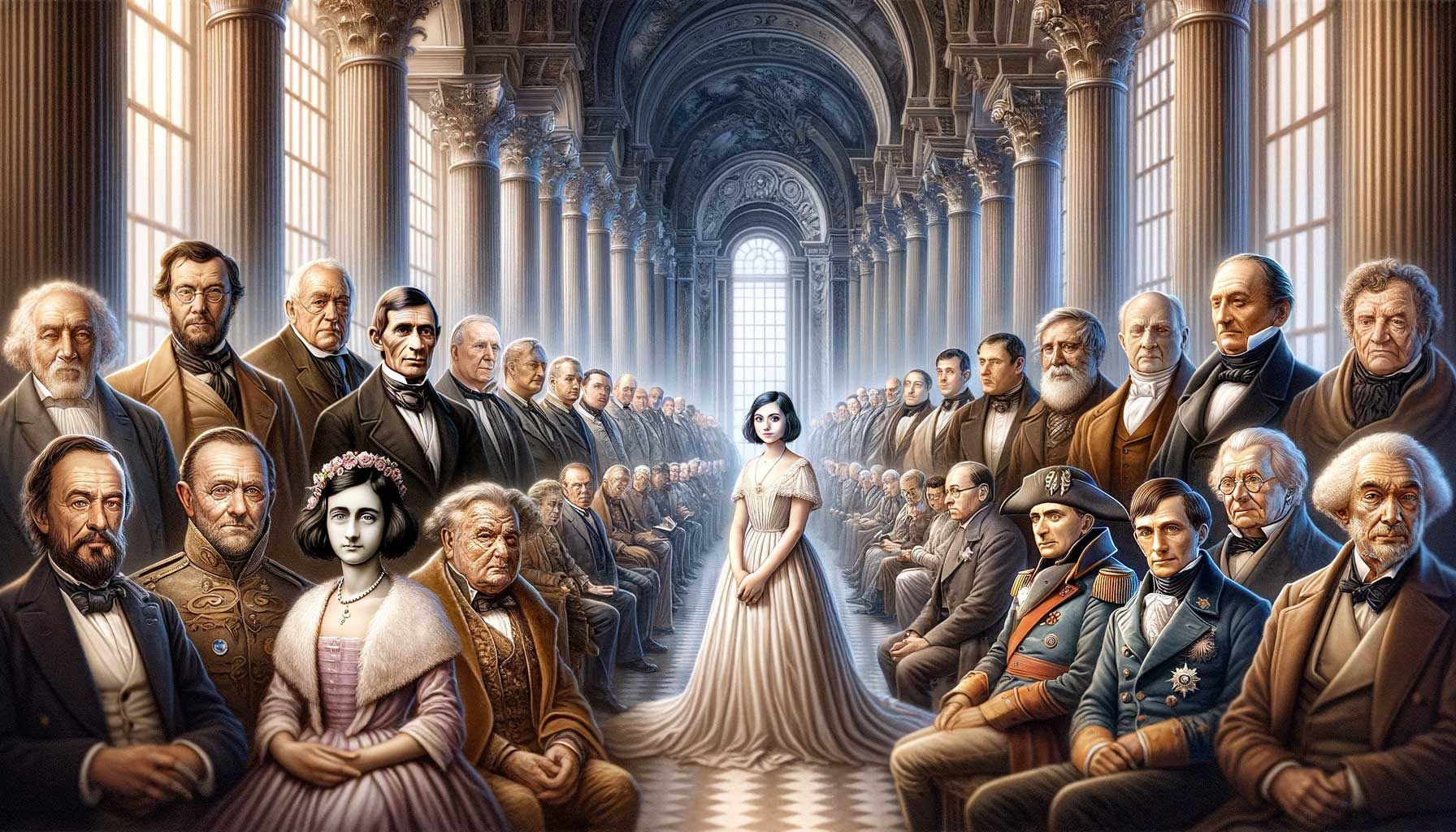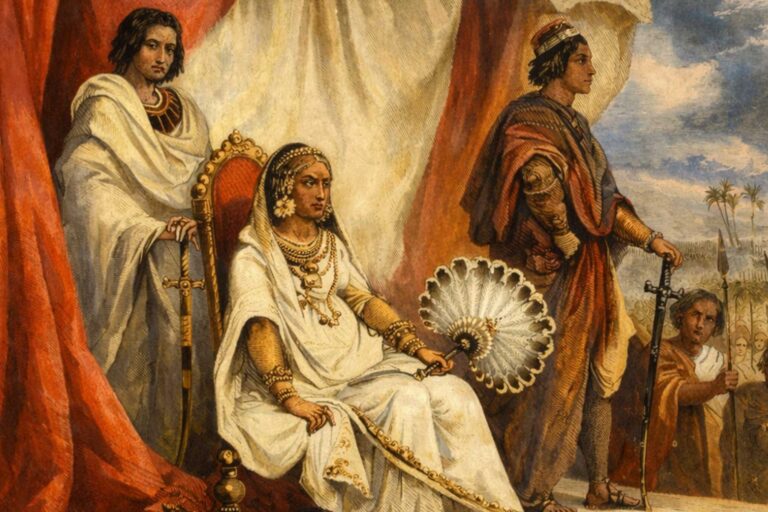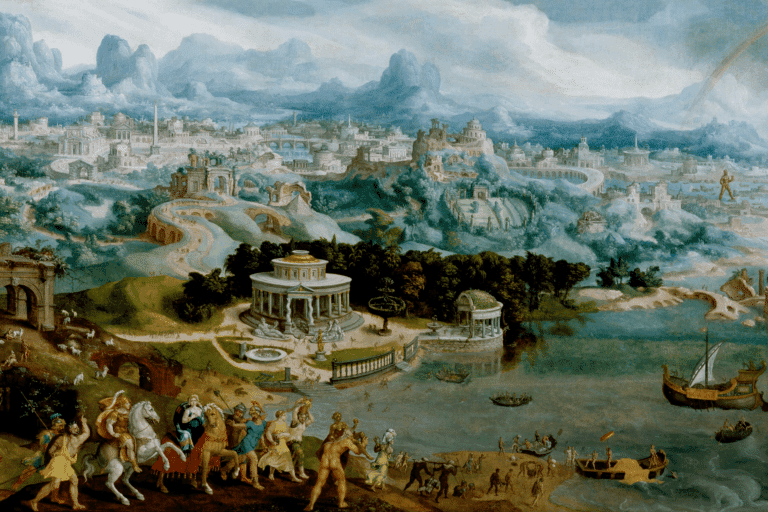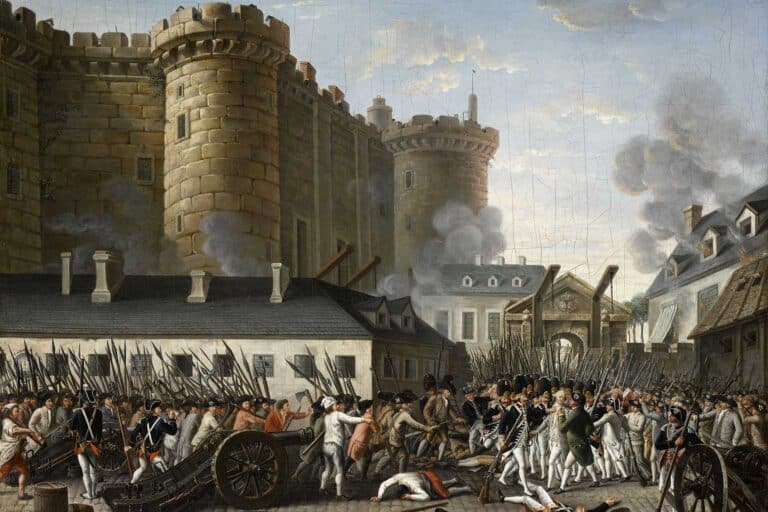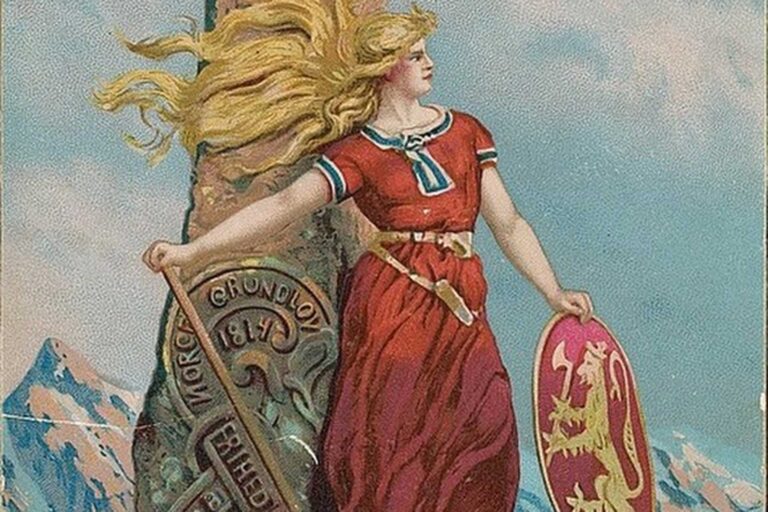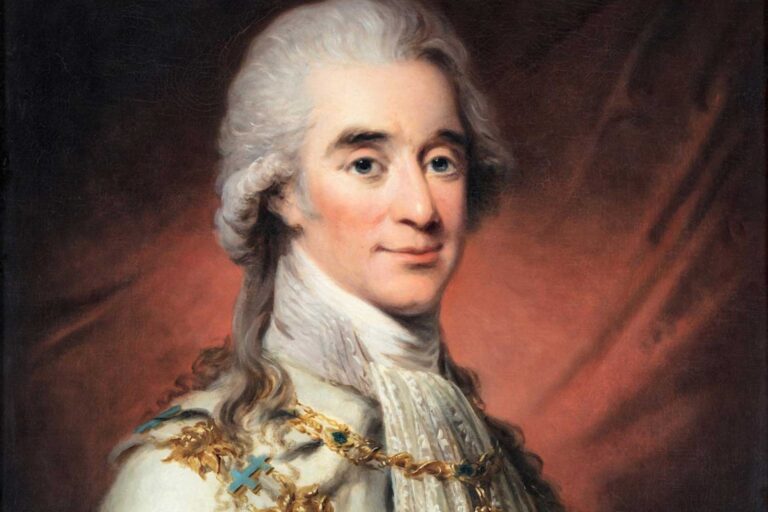Epic Quotes from Famous Historical Figures
Quotes from Famous Historical Figures have long captivated us, offering glimpses into the minds of those who shaped history. These words, often spoken in moments of triumph, despair, or contemplation, transcend time, giving us timeless wisdom and insight into the human condition. This article delves into the profound and sometimes provocative utterances of renowned leaders, thinkers, and pioneers. From the tactical musings of military strategists to the visionary ideas of political leaders, from the poetic reflections of literary giants to the groundbreaking thoughts of scientific minds, each quote is a thread in the rich tapestry of our shared past, providing lessons, inspiration, and a deeper understanding of the world we live in. Let’s dive into some of our favorites.
Epic Quotes from Famous Historical Figures
“Wars begin when you will, but they do not end when you please.”
Niccolò Machiavelli

Niccolò Machiavelli was a renowned Italian Renaissance political philosopher and historian, celebrated for his insightful analysis of statecraft and power. Born in Florence in 1469, he is best known for his seminal work “The Prince,” which dissected the realities of political leadership. This quote is from Machiavelli’s “Florentine Histories,” a comprehensive chronicle of Florentine history he penned in 1526, showcasing his adept skill as a historian and his deep understanding of political dynamics.
“I speak Spanish to God, Italian to women, French to men, and German to my horse.”
Charles V

Charles V was one of the most powerful European rulers of the 16th century, serving as Holy Roman Emperor from 1519 until his abdication in 1556. Born in 1500, he inherited a vast empire comprising territories in Central, Western, and Southern Europe, as well as parts of the Americas, making him a key figure in the political and religious affairs of his time. His reign was marked by constant warfare, most notably against France and the Ottoman Empire, and he played a crucial role in the European response to the Protestant Reformation.
“There are only two forces that unite men — fear and interest. All great revolutions originate in fear, for the play of interests does not lead to accomplishment.”
Napoleon Bonaparte
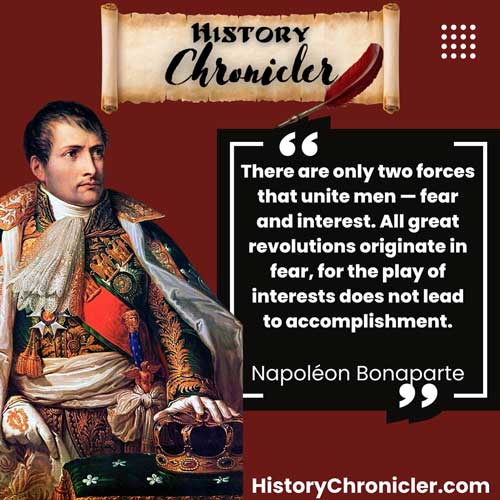
Napoleon Bonaparte, born in 1769 on the island of Corsica, rose from modest beginnings to become the Emperor of France and one of history’s most famous military leaders. His reign, from 1804 to 1814, and again briefly in 1815, was marked by rapid expansion of the French Empire and the implementation of significant legal reforms known as the Napoleonic Code. Napoleon’s ambitious conquests and subsequent downfall dramatically shaped European politics, leading to a restructured continent and influencing military strategies for generations.
“If your actions inspire others to dream more, learn more, do more and become more, you are a leader.”
John Quincy Adams

John Quincy Adams, born in 1767, was the sixth President of the United States, serving from 1825 to 1829, and was the son of the second U.S. President, John Adams. A distinguished diplomat before his presidency, Adams played key roles in negotiating pivotal treaties, including the Treaty of Ghent, which ended the War of 1812. Renowned for his strong principles and intellectual rigor, Adams was a staunch advocate for abolition and human rights, and he served in the House of Representatives after his presidency, continuing his public service until his death in 1848.
“In the long run, the sharpest weapon of all is a kind and gentle spirit.”
Anne Frank

Anne Frank was a Jewish girl born in 1929 in Frankfurt, Germany, who became a symbol of the human impact of the Holocaust. She is best known for her diary, which she wrote while hiding with her family from the Nazis in an Amsterdam attic from 1942 to 1944. Her poignant reflections, captured in “The Diary of a Young Girl,” offer a deeply personal account of life during the Holocaust and have made her an enduring symbol of resilience and hope in the face of oppression.
“Justice is the constant and perpetual wish to render every one his due.”
Byzantine Emperor Justinian

Justinian I, also known as Justinian the Great, was a Byzantine Emperor who reigned from 527 to 565 AD and is remembered for his ambitious and far-reaching administrative, military, and architectural projects. He is best known for his comprehensive codification of Roman law, the Corpus Juris Civilis, which laid the foundation for much of the modern legal systems in the Western world. Justinian’s era also witnessed the construction of the Hagia Sophia, one of the most significant architectural achievements of his reign, and his military campaigns aimed at reconquering lost Western territories marked a brief resurgence of Roman influence in Europe and the Mediterranean.
“I am not afraid of an army of lions led by a sheep; I am afraid of an army of sheep led by a lion.”
Alexander The Great

Alexander the Great’s statement, “I am not afraid of an army of lions led by a sheep; I am afraid of an army of sheep led by a lion,” underscores the paramount importance he placed on leadership in warfare. This adage reflects his belief that the quality and character of a leader are decisive factors in the outcome of battle, far outweighing numerical superiority or the individual prowess of soldiers. Alexander, known for his exceptional leadership skills and tactical genius, understood that a courageous and strategic leader could inspire and direct even the most unassuming force to victory against a stronger adversary. While the precise context and timing of this quote are not definitively recorded, it encapsulates Alexander’s philosophy of leadership and his approach to his military campaigns, where he often faced and overcame significantly larger forces through cunning, bravery, and the unwavering loyalty of his troops, whom he led with the ferocity and command of a lion.
In the End, we will remember not the words of our enemies, but the silence of our friends.
Martin Luther King Jr.

One of the most stirring quotations ever spoken by Martin Luther King Jr., this excerpt comes from King’s Letter from Birmingham Jail. He penned this famous open letter while in jail in Birmingham, Alabama in 1963 after he was arrested for protesting segregation. King wrote this letter in response to criticism from white clergy members who had called for African Americans to be patient. Here, he expresses his disappointment that these members of clergy remained silent rather than speaking out against injustice. We love this quote because it reminds us that failure to do what’s right isn’t borne of hatred sometimes, it’s apathy.
“Labor disgraces no man; unfortunately, you occasionally find men who disgrace labor.”
Ulysses S. Grant
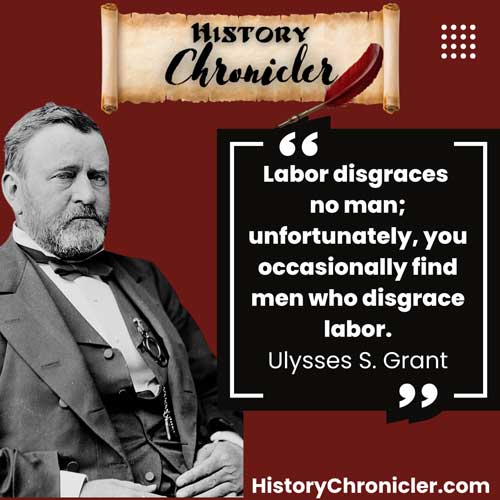
Ulysses S. Grant, the 18th President of the United States and a prominent Union general during the Civil War, held strong views on the dignity of labor, encapsulated in his quote, “Labor disgraces no man; unfortunately, you occasionally find men who disgrace labor.” Born in 1822 in Ohio, Grant came from humble beginnings and was no stranger to hard work, having worked in his father’s tannery as a boy. His later life was marked by his leadership during the Civil War and his two-term presidency, during which he supported Reconstruction and civil rights for freed slaves. Grant’s respect for labor reflected his belief in the fundamental dignity of all forms of work, a principle that guided his efforts to unify and heal the nation after the war.
“I found Rome when it was a city of bricks and left it a city of marble”
Augustus, Roman Emperor

The Roman Emperor Augustus, born Gaius Octavius, is often regarded as one of the most transformative figures in Roman history, steering the empire from chaos to stability after the fall of the Roman Republic. His famous statement, “I found Rome a city of bricks and left it a city of marble,” is a reflection of his vision and legacy. Beyond its literal meaning of architectural transformation, the quote symbolizes his ambition to elevate Rome culturally, politically, and economically. Augustus spearheaded numerous building projects, including the construction of temples, public forums, and aqueducts, which not only beautified the city but solidified
“A good plan violently executed right now is far better than a perfect plan executed next week.”
General George S Patton

General George S. Patton, one of the most audacious and effective military leaders of World War II, was known for his relentless drive and aggressive tactics. His famous quote, “A good plan violently executed right now is far better than a perfect plan executed next week,” reflects his philosophy that action and momentum outweigh hesitation and over-planning. Patton believed that in the chaos of battle, swift and decisive execution was critical to success, even if the plan wasn’t flawless. His leadership in the North African, Sicilian, and European campaigns demonstrated this mindset, as his ability to make rapid, calculated decisions often turned the tide of battle in favor of the Allies.
“I am not a traitor to my people. My comrades will avenge me.”
Lepa Radić

In early 1943, during the Battle of Neretva, Yugoslavian resistance fighter Lepa Radić was captured by German forces while defending civilians who were trying to escape an attack.
The Nazis interrogated her, demanding that she reveal the names of her comrades. She refused to betray them, even under threats of torture and execution. As she stood on the gallows, the German officers gave her a final chance to save herself by disclosing resistance leaders’ identities.
“Had you fought like a man, you need not have been hang’d like a dog.”
Anne Bonny to Calico Jack
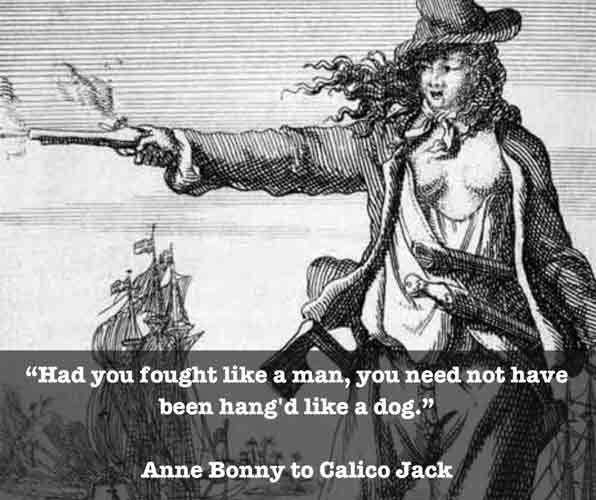
Anne Bonny’s scathing remark to Calico Jack as he was led to his execution reflected both her contempt for his cowardice and her own defiant spirit. While Jack and his men chose to drown their fate in rum rather than face their enemies, Anne and Mary Read fought fiercely when the pirate hunters attacked. Their resistance, however, was in vain, as they were ultimately captured alongside the rest of the crew. Unlike the men who surrendered without a fight, Anne and Mary’s defiance earned them a lasting place in pirate lore.
Bonny’s words to Jack were not just an insult but a reminder of the pirate code—bravery and defiance until the very end. Jack Rackham, once a notorious pirate, had failed to uphold that standard, and Anne made sure he knew it. While Jack was executed for his crimes, Anne’s fate remains shrouded in mystery. Some say she was released, others claim she escaped, but what is certain is that her name endures as one of the most legendary female pirates in history.
“Either I will find a way or I will make one”
Hannibal Barca
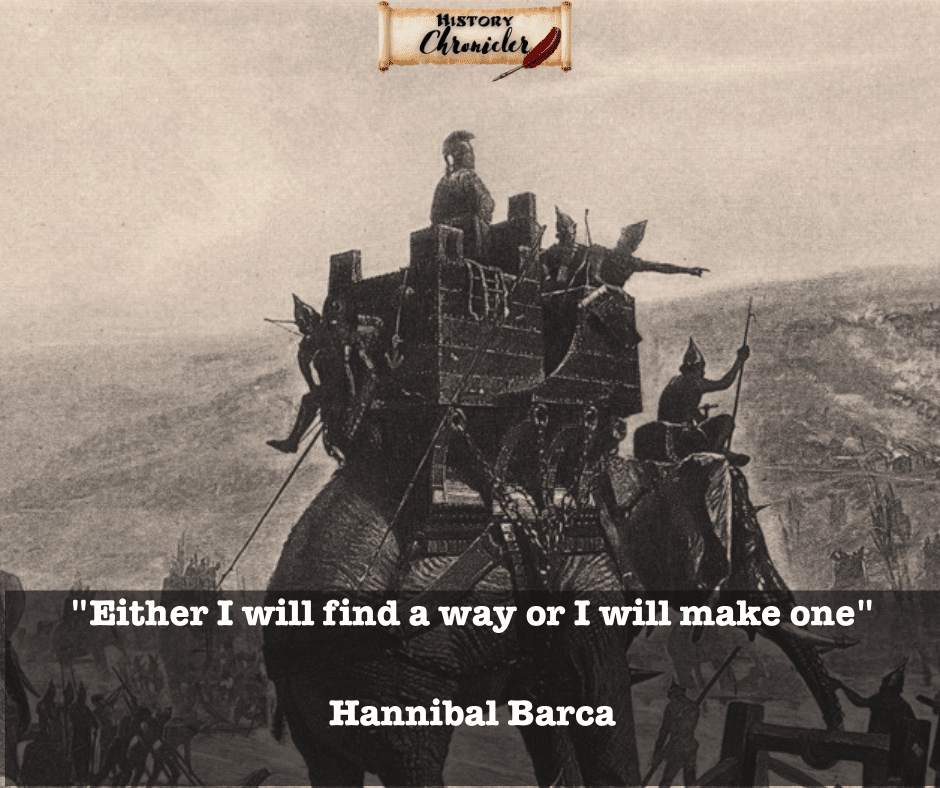
Hannibal Barca, the brilliant Carthaginian general of the Second Punic War, is remembered as one of history’s most formidable military strategists. His declaration, “Either I will find a way or I will make one,” embodies his fearless ingenuity and unwavering resolve in the face of adversity. Hannibal famously defied the odds by leading his army—including war elephants—across the treacherous Alps to strike at the heart of the Roman Republic. This quote reflects not only his tactical brilliance but also his belief that limitations exist only for those unwilling to overcome them. Hannibal’s legacy endures as a testament to the power of determination and creative problem-solving in warfare.
“Knowing others is wisdom, knowing yourself is Enlightenment.”
Lao Tzu
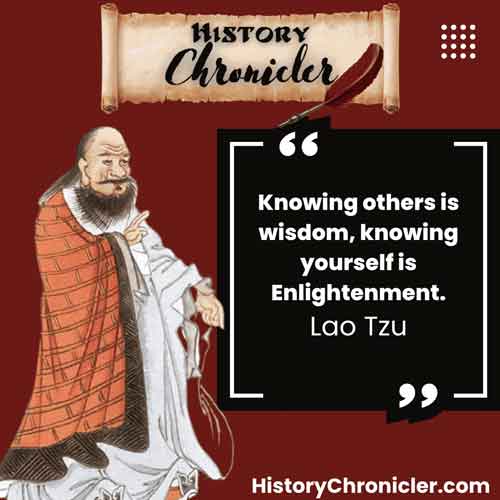
The ancient Chinese philosopher Lao Tzu, credited as the founder of Taoism and author of the Tao Te Ching, offered profound insights into the nature of life, balance, and the self. His quote, “Knowing others is wisdom, knowing yourself is Enlightenment,” speaks to the deep distinction between external understanding and internal awakening. To know others requires observation, empathy, and intellect—qualities that reflect worldly wisdom. But to truly know oneself demands a higher level of introspection, honesty, and spiritual clarity. Lao Tzu suggests that while understanding the world is valuable, the ultimate path to peace and harmony lies in self-awareness. Enlightenment, in this view, is not about mastery over others but about alignment with one’s own nature.
“I don’t know how WWIII will be fought, but WWIV will be fought with sticks and stones.”
Albert Einstein

Albert Einstein, one of the most influential physicists of the 20th century, revolutionized science with his theories of relativity and contributions to quantum mechanics. Born in Germany in 1879, Einstein was also a passionate humanitarian who spoke out against war and advocated for global disarmament. This quote, often cited in discussions about nuclear conflict, reflects Einstein’s deep anxiety over the destructive potential of advanced weaponry and his belief that future wars could regress humanity to its most primitive state.
“I wish to have no Connection with any Ship that does not Sail fast, for I intend to go in harm’s way,”
John Paul Jones

John Paul Jones was a daring and determined naval commander during the American Revolutionary War, often hailed as the father of the United States Navy. Born in Scotland in 1747, Jones brought a fierce spirit and unmatched resolve to the fight for American independence on the high seas. The quote, “I wish to have no Connection with any Ship that does not Sail fast for I intend to go in harm’s way,” reflects his bold, unrelenting approach to naval warfare. It captures his preference for swift, agile ships capable of engaging in aggressive tactics, and it underscores his readiness to confront danger head-on in service of his cause.
“Coffee – the favorite drink of the civilized world.”
Thomas Jefferson

Thomas Jefferson, one of America’s most influential Founding Fathers and the principal author of the Declaration of Independence, had a refined appreciation for culture, intellect, and daily rituals. Among those rituals was his enduring love of coffee, which he famously praised as “the favorite drink of the civilized world.” This quote speaks volumes about Jefferson’s belief in progress, enlightenment, and the comforts that elevate everyday life. For him, coffee was more than a beverage—it was a symbol of refinement, conversation, and a cultivated society. In those simple words, Jefferson connected the act of drinking coffee to the very essence of civilized living.
“No friend ever served me, and no enemy ever wronged me, whom I have not repaid in full”
Lucius Cornelius Sulla

Lucius Cornelius Sulla, the formidable Roman general and statesman, carved his legacy not just through conquest but through an unflinching code of loyalty and retribution. His famous words—“No friend ever served me, and no enemy ever wronged me, whom I have not repaid in full”—reflect a man who saw the world in sharp contrasts of allegiance and offense. For Sulla, gratitude and vengeance were not passing emotions but duties to be fulfilled with precision. In this quote, we glimpse the relentless discipline and personal justice that defined his rise to power and his brutal reign as dictator. It reveals a man who believed in balance above all else—measured in favors returned and debts repaid, to the last coin.
“It does not matter how slowly you go as long as you do not stop.”
Confucius
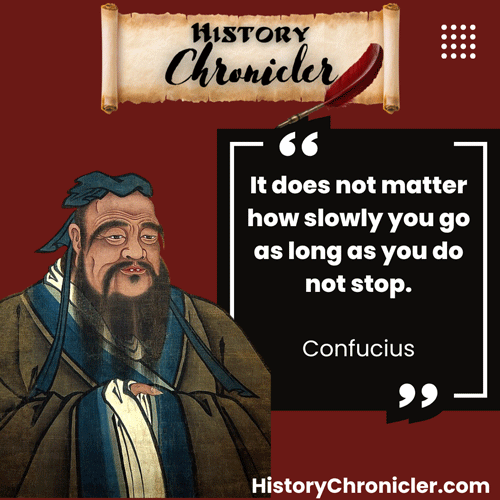
Confucius, the revered Chinese philosopher whose teachings continue to shape Eastern thought, offered timeless wisdom on the nature of perseverance. His words—“It does not matter how slowly you go as long as you do not stop”—capture a profound belief in the quiet power of persistence. For Confucius, progress was not about speed or recognition but about unwavering dedication to a goal, no matter how distant. In this simple yet enduring truth, he reminds us that resilience, not haste, is the mark of true strength. It’s a philosophy rooted in patience and discipline—a call to keep moving forward, even when the path is long and the steps are small.
“What’s the use of a fine house if you haven’t got a tolerable planet to put it on.”
Henry David Thoreau

Henry David Thoreau, the American transcendentalist and naturalist, often challenged society’s values through his reflections on simplicity, nature, and human purpose. In his quote—“What’s the use of a fine house if you haven’t got a tolerable planet to put it on”—Thoreau delivers a piercing commentary on the disconnect between material wealth and environmental responsibility. To him, true prosperity wasn’t measured in possessions but in our relationship with the earth that sustains us. Long before modern environmentalism, Thoreau recognized that no personal comfort could compensate for a world in ecological decline. His words remain a powerful reminder that without stewardship of our planet, all human achievements lose their foundation.
“The greatest glory in living lies not in never falling, but in rising every time we fall.”
Nelson Mandela

Nelson Mandela, the iconic leader of South Africa’s anti-apartheid movement and a symbol of endurance through adversity, understood that true greatness is forged in struggle. His quote—“The greatest glory in living lies not in never falling, but in rising every time we fall”—reflects a belief that setbacks are not signs of weakness, but opportunities to demonstrate strength. Mandela’s own life, marked by 27 years of imprisonment and an unwavering fight for justice, gave weight to his words. In this powerful reminder, he reframes failure not as defeat, but as a necessary step on the path to growth, courage, and ultimately, transformation.
“They died hard, those savage men – like wounded wolves at bay. They were filthy, and they were lousy, and they stunk. And I loved them.”
Douglas MacArthur

General Douglas MacArthur’s words capture the brutal reality and unbreakable bond forged in the heart of war. His description of the soldiers—grimy, battered, and relentless—paints a picture of men pushed beyond their limits, yet unwavering in their fight. Calling them “wounded wolves at bay,” he recognized not just their grit but their sacrifice. In honoring their toughness and tenacity, MacArthur reminds us that love for one’s troops doesn’t come from perfection—it comes from shared struggle, loyalty, and respect earned on the battlefield.
“Stop quoting laws at us. We carry swords.”
Pompey

Pompey’s words—“Stop quoting laws at us. We carry swords.”—strip away the pretense of civility to reveal the raw essence of power. In this blunt declaration, he makes it clear that authority backed by force will not be restrained by legal argument or moral appeal. It is a reminder that in moments of political or military dominance, the rule of law can be eclipsed by the rule of strength. His statement is not just a boast, but a warning: those who wield the sword decide which rules stand, and which fall.
“Burn old wood, read old books, drink old wines, have old friends.”
Alfonso the Wise

Alfonso the Wise’s words speak to the enduring value found in the time-tested. Old wood burns hotter, just as old books carry the depth of wisdom only years can season. Fine wine matures with patience, its character deepened by the passage of time, much like the trust and understanding that grow between lifelong friends. In celebrating what has stood the test of years, Alfonso reminds us that the richest rewards come from what is cultivated, cherished, and kept close over a lifetime.
“Tell me what brand of whiskey Grant drinks. I want to send a barrel of it to my other generals.”
Abraham Lincoln

Grant had gained a reputation as a heavy drinker during the Civil War, and political enemies used this claim to agitate for his removal. One famous response to these complaints was said to have been “Tell me what brand of whiskey that Grant drinks. I would like to send a barrel of it to my other generals.” Although amusing, it is almost certainly apocryphal, an unsupported myth that was probably fabricated after the war to illustrate Lincoln’s wit and to emphasize his faith in Grant despite the attacks on him. Lincoln did have firm support for his general, however, as evidenced by his real statement: “I can’t spare this man; he fights.”
“A clever person solves a problem, but a wise person avoids it”
Albert Einstein
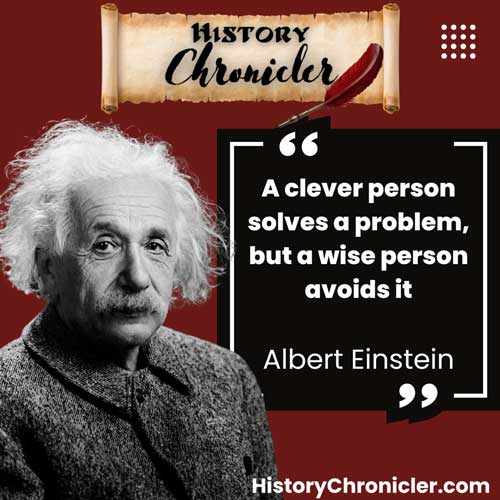
This quote, often attributed to Albert Einstein, captures his philosophy that intelligence is not just about analysis or reaction, but about foresight and prevention. Whether or not Einstein ever said these exact words remains uncertain—no definitive record links the phrase to his writings or speeches. Still, the sentiment aligns closely with his well-documented belief in simplicity and prudence: that true wisdom lies not in fixing chaos, but in designing a world where chaos is less likely to occur. Like many popular Einstein quotes, it endures because it reflects the balance between intellect and wisdom that defined his legacy.
“The greatest glory in living lies not in never falling, but in rising every time we fall.”
Confucius
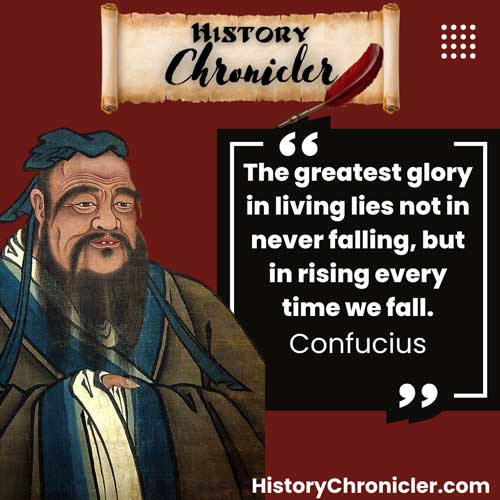
This inspiring line is often credited to Confucius, though its phrasing is more modern than anything found in his recorded teachings. The sentiment, however, echoes his philosophy—emphasizing perseverance, humility, and moral strength over perfection. The idea that true honor comes from recovery rather than flawlessness has appeared across centuries of wisdom traditions, from Chinese classics to later thinkers like Nelson Mandela, who famously echoed the same words. Whether ancient or adapted, the message endures: resilience, not avoidance of failure, defines the measure of a life well lived.
“Let no man pull you low enough to hate him.”
Martin Luther King, Jr.

This powerful admonition, often attributed to Dr. Martin Luther King Jr., reflects his unwavering belief in the moral strength of love over hatred. While the exact wording doesn’t appear in his major speeches or writings, it captures the essence of his message throughout the civil rights movement: that dignity and compassion must prevail even in the face of injustice. King’s philosophy of nonviolence was not passive—it demanded immense courage and restraint. Whether paraphrased or directly quoted, this sentiment stands as a timeless reminder that hatred diminishes the hater more than the hated, and that true strength lies in rising above it.
“A woman is like a tea bag — you never know how strong she is until she gets in hot water.”
Eleanor Roosevelt

This frequently repeated quotation is one of the most well-known quotes from Eleanor Roosevelt, and it succinctly summarizes her sense of humor, fortitude, and faith in the silent strength of women. She may not have penned it, and it could be a paraphrased misquote, but it serves to honor the life she led, facing heartbreak, public criticism, and political strife with poise and persistence. If Roosevelt did not say it, the sentiment is certainly one she would have expressed; like the tea bag in her analogy, true strength is only known when tested by heat.
“Never interrupt your enemy when he is making a mistake.”
Napoleon Bonaparte

This saying is commonly associated with Napoleon Bonaparte and is a concise summation of his approach: his patience, calculation, and general pragmatism on the battlefield. The specific phrasing can be complicated to confirm from a single source, but the concept remains strongly linked to his military approach. Napoleon was known for allowing his enemies to make mistakes or over-commit their forces before striking a decisive blow.
The quote has endured because of its succinct encapsulation of the key strategic lesson: sometimes doing nothing is the best course of action. Whether exactly genuine or polished later, it remains a pithy distillation of the cold logic that made Napoleon one of the most successful military leaders of all time.

